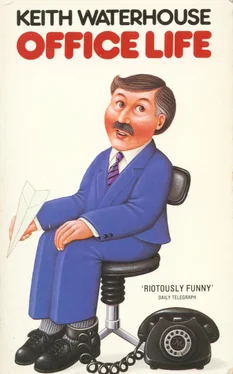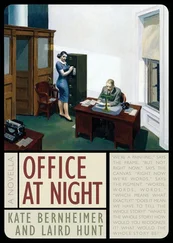Ferrier, tugging out one of the Penguins with undue haste so that several other books were dislodged and slithered to the floor, peered at Gryce over his spectacles as if taking his measure. He struck Gryce as a bundle of nervous energy, yet at the same time commanding a calm authority. Thelma, at any rate, had scuttled to pick up the fallen books without anyone telling her to do so, very unusual for her.
'Have you ever read any Arnold Bennett, Mr Gryce?' In the context of Ferrier's bookishness, the question did not sound at all out of the way to Gryce, who supposed he had probably started many a conversation with a reference to a favourite author.
Gryce had not read any Arnold Bennett, although he had seen one or two instalments of a television adaptation of Clayhanger. He saw that it was a dog-eared copy of that work, it looked as if it had been fished out of a dustbin, that Ferrier was handing to him.
'Just glance at the passage I've marked, would you?'
He took the book with grave mistrust. He had not enjoyed Clayhanger, too slow-moving by half had been his verdict. Besides, he detested people giving him something to read and then standing over him while he did so: he never knew whether he was supposed to laugh explosively, comment 'Honestly!' or make indignant tutting noises.
He focussed on the paragraph that had been underscored in red ballpoint.
'… The trickling, calm commerce of a provincial town was proceeding, bit being added to bit and item to item, until at the week's end a series of apparent nothings had swollen into the livelihood of near half a score of people. And nobody perceived how interesting it was, this interchange of activities, this ebb and flow of money, this sluggish rise and fall of reputations and fortunes, stretching out of one century into another and towards a third! Printing had been done at that corner, though not by steam, since the time of the French Revolution. Bibles and illustrated herbals had been laboriously produced by hand at that corner, and hawked on the backs of asses all over the county; and nobody heard romance in the puffing of the hidden steam-engine multiplying catalogues and billheads on the self-same spot at the rate of hundreds an hour. '
It conveyed absolutely nothing to Gryce. Without comment he handed the book back, still open at the marked passage, in the assumption that Ferrier was about to point out a hidden joke or unfortunate misprint. Ferrier, however, closed the book and slipped it absently into the pocket of his dust-coat.
'Printing, Mr Gryce, is the lifeblood of commerce. Wherever you see a thriving business community, you'll find print shops somewhere. If the print shops move away or close down, you may be sure that business is failing. If on the other hand there is a district or neighbourhood that has already failed, where the factories are empty and boarded up, and a printer sets up his press in some back street or alley, that's a sign that things are on the move again. Printing makes commerce, Mr Gryce, it's at the very heart of commerce, it is commerce.'
A set speech, by the sound of it. Gryce saw that the others had quietly drawn near and had formed themselves in a group around Ferrier's desk and were listening respectfully. Copeland, who apparently was No. 2 rather than No. 1 in whatever set-up they had here, showed no resentment at being upstaged by one who must have been very much his junior when employed in Stationery Supplies. On the contrary he was hanging on to Ferrier's every word as if he were the saviour of mankind.
'The jobbing printer is like the old-time travelling apothecary, Mr Gryce, he can cure all ills, or anyway he'll make you think he can which often comes to the same thing. Is your business slack? He'll print your posters and handbills. Even a brochure if you want it: how many thriving companies have come into this world riding on a coloured brochure? He'll print the slogan you put in your window, the hours-of-business card you hang inside your door, the business calendar your customers hang on their walls. But do your customers know where to find you? You'll need letterheads. Do they have to come to you or will you send your goods out to them? That's mail order, that's print. Your catalogue, that's print. Attractive packaging, or common-or-garden paper bags, that's print. And most important, do your customers pay their bills? Well, they certainly won't if you don't have any billheads to send out to them. And if I were you, I'd also order a stock of those little printed labels: "May we draw your attention to the fact that this account is now considerably overdue. An early settlement would be appreciated."'
There were polite titters at this. Gryce wondered if Ferrier was possibly a part-time lecturer at one of those night-school printing courses he had mentioned. He certainly had the gift of the gab, he could make whatever it was he was talking about sound interesting.
'I don't know how much if anything you know about me, Mr Gryce. You must have heard something or you wouldn't have found us here. I've spent a lifetime in printing. I was trained at the Pilgrim Press in Hammersmith. It wasn't as grand as it sounds, dance invitations and raffle tickets rather than limited editions and Mr Bennett's illuminated herbals! But we had some out-of-the-way work from time to time: a community newspaper, a series of lithographs, a privately published book, I did the binding for that and tooled the leather, there was no job I couldn't do or didn't do. We were unionized but everyone pitched in, there was work to be done. Then we were taken over by the Albion Printeries and here I came, into this very building. Not that I minded much, there was a dual carriageway scheme in the pipeline and we'd have had to close down anyway. But mark this: when that dual carriageway got under way and they started demolition, ninety per cent of our business was carried off by the bulldozer. So we brought nothing to Albion Printeries at all: they laid out much-needed capital and only weakened their own position.'
Fascinating, Gryce was quite sure, but he didn't see what possible concern it was of his. Was no one going to ask him what he was doing here? For all they knew he was going to march straight back to British Albion and report the whole bunch of them to Lucas of Personnel. Or at the very least, to Pam and her executive committee. Now that was a thought to be conjured with: how did this gang stand with the Albion Players; there was only one member here and that was Vaart? Whose side, if anybody's, were they really on?
Vaart, Albion Players or not, seemed very much in his element here and had ventured to interject a word of his own: 'Still, you gorrer admit, there was plennyer work ere in dem days. It was all go, mornin till nigh.'
'Oh, absolutely,' agreed Ferrier, but he continued to address himself directly to Gryce. 'I don't know whether you can imagine what this area was like a few years ago. All those lock-up workshops you see out in Grain Yard were occupied, by every kind of business, there was a waiting list for them. The big warehouses may have been empty, because the docks were finished, but there were all sorts of plans to turn them to other uses. They never came to anything, the plans weren't big enough I suppose: the council wanted to clear the whole district so they could rebuild from scratch, something grandiose. So when the workshop leases ran out they weren't renewed, one place after another closed down, the shops and back-street cafes went, the commerce died, and Albion Printeries died with it. At a stroke of a pen they turned us all into clerks and storemen: we sat crammed in this very office doing useless paperwork — inventories, stock-lists, filing bits of paper, more inventories — against the day they moved us across to British Albion. Needless to say, the grand new redevelopment never took place, they could just as well have left us scratching a living. As our friend Arnold Bennett says, "bit being added to bit and item to item, until at the week's end a series of apparent nothings had swollen into a livelihood".'
Читать дальше












